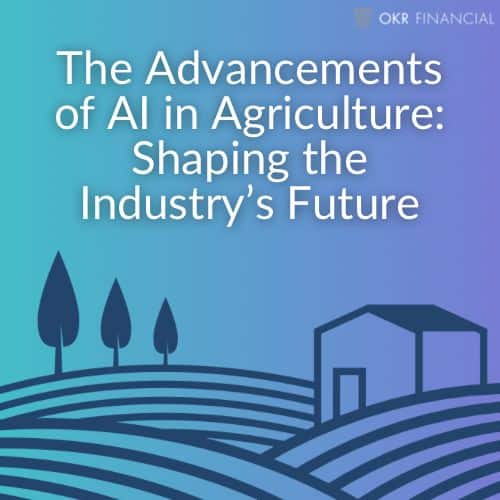With its rapid evolution, artificial intelligence (AI) is transforming various industries, including agriculture. Its potential applications are revolutionary, including the creation of artificial meat, improvements in supply chain logistics and inventory management, and better farming practices. As AgriTech investments continue to rise, both startups and major players must utilize AI to transform the agricultural value chain and shape the industry’s future.
AI for Supply Chain Logistics
Recent unexpected events have disrupted global supply chains, leading to the creation of a multi-billion dollar industry that applies AI and other advanced technologies to minimize disruptions. Firms such as Interos Inc, Fero Labs, and KlearNow Corp use AI and data science to help businesses react quickly to supplier snarls, monitor raw material availability, and navigate cross-border trade complexities. Gartner, a tech research firm, predicts that more than 80% of new supply chain applications will use AI and data science by 2025.
AI for Artificial Meat
Startups in Israel, a tech-friendly hub, have developed new high-tech meat substitutes that use AI algorithms to create the closest mimicry of animal protein ever manufactured by humans. By working with 3D printers, AI programs print layers with different consistencies, giving a piece of artificial steak a more muscular or chewy sensation in one section and a fattier, juicier taste experience in another. The resulting alt-meat has been described by experts and consumers as stunningly tasty.
AI for Farming Practices
AI can also improve the earliest phase of the agricultural lifecycle by creating better crop inputs before seeds are planted. Gene editing technology, such as CRISPR, can design more resilient and high-yielding seeds, and companies are applying AI to improve the speed and efficacy of this process. Because many crops are genetically complex, AI can help researchers understand the effects of editing multiple genes. Furthermore, AI can enhance various farming practices, including crop monitoring, sales prediction, input management, livestock monitoring, and farm automation.
Protein Industries Canada’s Artificial Intelligence Program
Protein Industries Canada is one of Canada’s five Global Innovation Clusters, focused on advancing the country’s plant-based food, feed, and ingredients sector. As this industry continues to evolve, the organization recognizes the need for trailblazing companies across the country to expand the tools, resources, and technologies that help keep their businesses innovative and sustainable.
To meet this need, Protein Industries Canada is investing $30 million in collaborative projects that utilize artificial intelligence to sustain and innovate Canada’s plant-based food, feed, and ingredients sector. The program aims to provide companies with access to new tools and technologies that can help meet the country’s goal of achieving $25 billion in global plant-based product sales by 2035. Projects may be solicited or unsolicited, as long as they align with and contribute to advancing Canada’s plant-based food and ingredients ecosystem.
Building on the eligibility criteria required by the program, Jennifer Jannuska, Director of Intellectual Property for Protein Industries Canada, shares that all eligible projects must “come from a consortium of at least two member companies, including at least one SME, with an emphasis on Canadian companies (although non-Canadian companies may also be permitted within a consortium under certain circumstances).” She also states that the projects must “collaborate on a technology solution in the agrifood industry, with specific ties to plant protein.”
When it comes to recommendations for founders undergoing this path, Jennifer begins: “It is important to remember that this is a reimbursement program, not a grant. Therefore, companies must be prepared to pay for expenses themselves. Up to 45% of eligible expenses are reimbursed by Protein Industries Canada, and contributions between consortium members do not need to be equal.”
“I would advise,” Jennifer continues, “companies to carefully consider how their available data sources tie in with their project objectives. A data feasibility assessment is part of the evaluation process. Additionally, it’s important to consider how each company’s project outcomes will be captured in intellectual property (IP) assets and ultimately commercialized. If it’s a service rather than a product, we appreciate specifics on how the service will be accessed and who the intended users are. I would point interested applicants to our Program Guide for further information, as this just scratches the surface.”
Conclusion
Although the agriculture industry and farmers have made significant progress in providing sufficient healthy food to a growing global population, challenges such as climate change, population growth, and food access remain. Emerging technologies, like AI, can help solve these challenges by building a resilient global food supply. By significantly improving supply chain logistics, inventory management, and farming practices, including better crop inputs, crop monitoring, and farm automation, AI is the key to the future of agriculture. As AgriTech investments continue to increase, the future of agriculture looks bright with the aid of AI.







